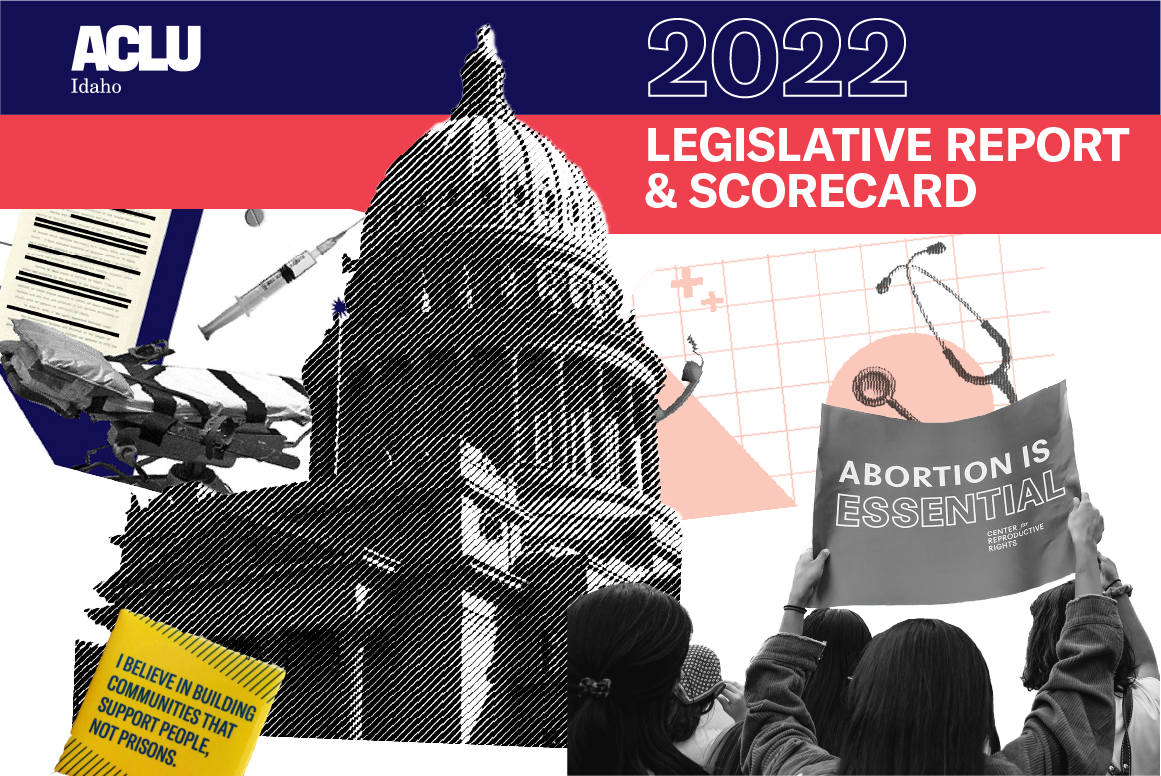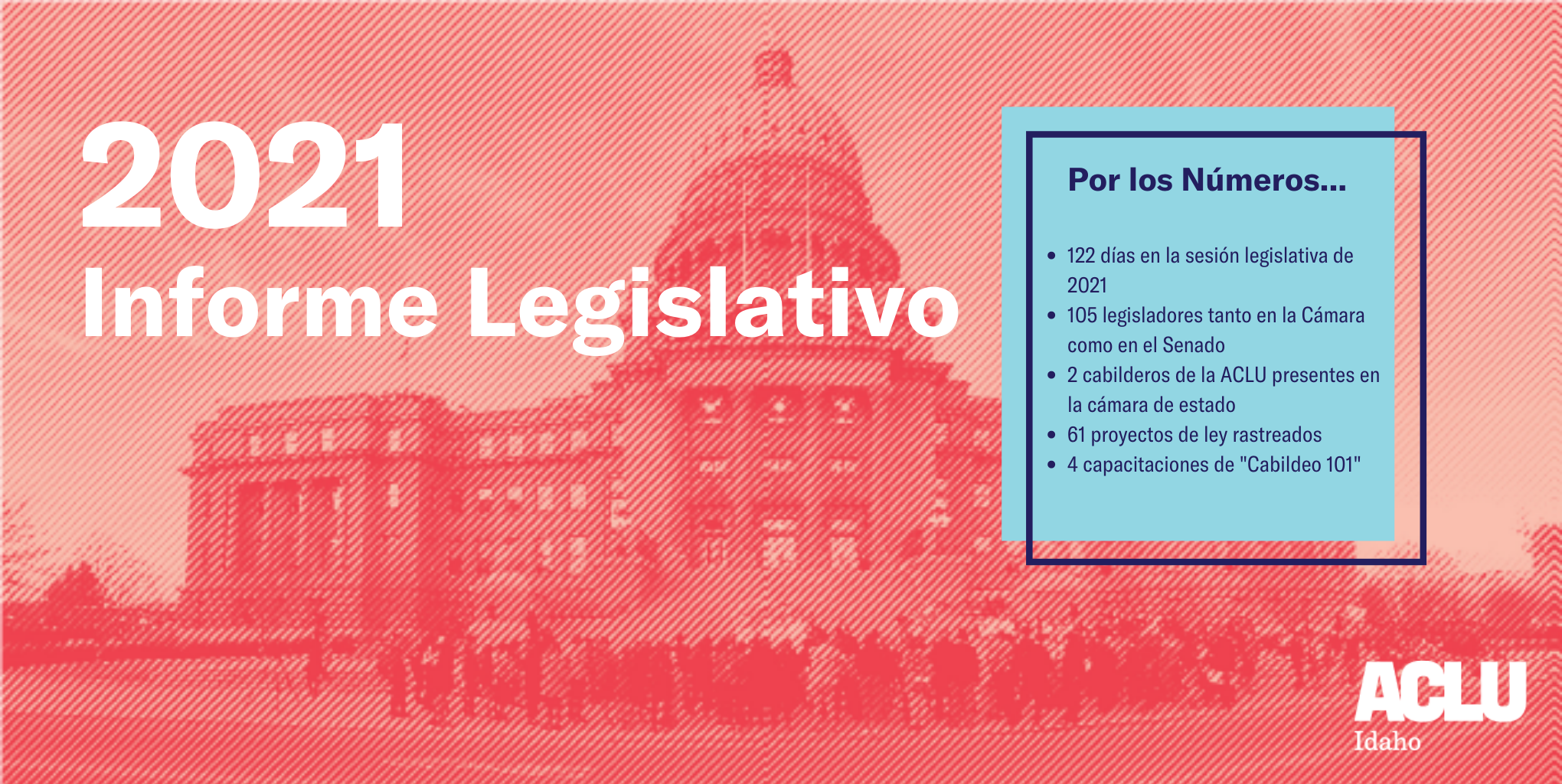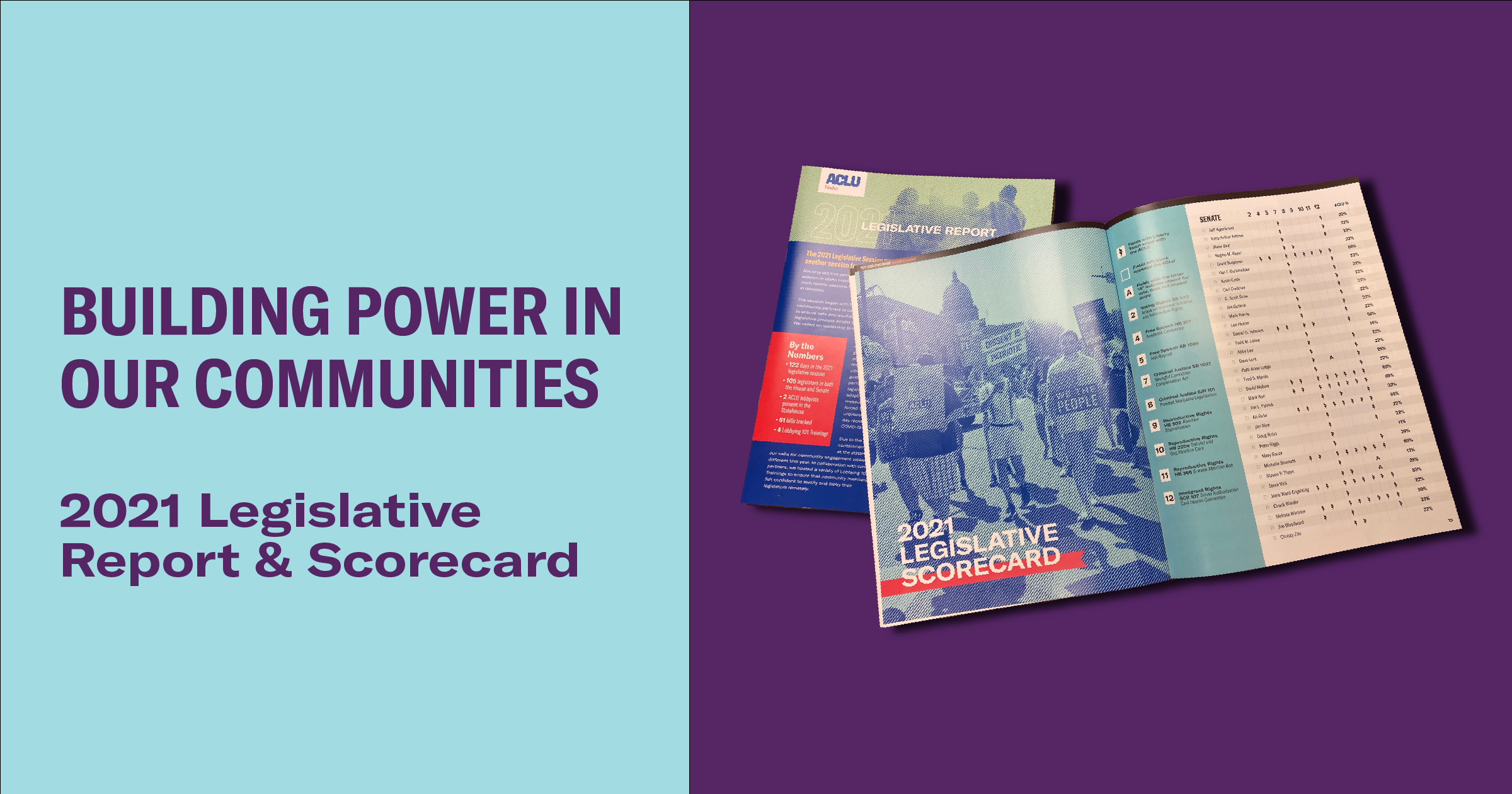2022: another session of relentless attacks on Idahoans’ civil rights and civil liberties.
- 81 days in the 2022 legislative session.
- 105 legislators in both the House and Senate.
- 1 ACLU lobbyists present in the Statehouse.
- 4 online community advocacy trainings.
- 58 total bills tracked.
The Idaho Legislature continues to be a hostile environment for rights we hold dear. Idaho was the second state in the country, following Texas, to pass a vigilante 6-week abortion ban (SB 1309) that allows family members to sue abortion providers for a minimum of $20,000 if they perform an abortion after 6-weeks of pregnancy. The bill was signed into law, despite Governor Little’s own fear that the novel civil enforcement mechanism would prove to be “both unconstitutional and unwise.”
The Idaho Department of Corrections was also successful in ushering through legislation that shrouds the death penalty in a veil of secrecy— denying the public, the courts, and counsel for the condemned from getting critical information about the source and suppliers for execution drugs.
Despite these significant losses, with your help, we defeated a host of other harmful bills. While an onslaught of voter restriction bills passed the House, including bills that would eliminate ballot drop boxes and criminalize ballot assistance—the bills were defeated in the Senate. We also worked alongside partners to defeat HB 675, Idaho’s anti-trans legislation that would criminalize medical providers who offer life-saving care to trans youth. The victory would not have been possible without the voices of medical providers, parents, and youth who spoke out in strong opposition against the bill.
The issues noted above just scratch the surface. We invite you to read on to learn more about our 2022 legislative work in the report below.
Also, don’t forget to review our scorecard so you can track how your elected officials voted on civil rights and civil liberty issues you care about!
What is the Legislative Scorecard?
The ACLU of Idaho Legislative Scorecard documents the voting patterns of your state Senator and Representatives during the 2022 Legislative Session. At a glance, you’ll see how your legislators voted on issues like voting access, free speech, LGBTQ equality, reproductive freedom, and criminal legal reform. The votes presented in the Legislative Scorecard are those considered by either the full House or the full Senate. Some bills received votes from the full House but did not get out of committee to be voted on by the full Senate. This is why there are fewer bills listed on the Senate Scorecard.
Why is the scorecard created?
The Legislative Scorecard is a crucial accountability tool. We encourage you to use this scorecard to give your elected officials feedback on their votes during the 2022 Legislative Session. Direct communication with your elected officials is a valuable way to encourage them to stand up for freedom and protect our constitutional rights.
View, download and print the full 2022 Legislative Report & Scorecard below.
Date
Tuesday, May 17, 2022 - 6:00pm
Featured image
Show featured image
Hide banner image
Documents
Show related content
Pinned related content
2021 Legislative Report
Tweet Text
[node:title]
Type
Menu parent dynamic listing
Show PDF in viewer on page
Style
Standard with sidebar
Show list numbers
Click here to read this in English
La Sesión Legislativa de 2021 fue otra sesión para los libros de historia.
Este año no solo presento la sesión legislativa mas larga en la historia de Idaho, También marco una de las sesiones más hostiles para los derechos y libertades civiles en décadas.
La sesión comenzó con la ACLU de Idaho uniéndose a los socios de la comunidad para pedir a la Legislatura de Idaho que garantice una participación segura y equitativa en el proceso legislativo en medio de una pandemia en curso.
Pedimos a los dirigentes que aplazaran el periodo de sesiones oadoptaran medidas de contención y directrices claras y equitativas para la participación remota. Si bien la legislatura finalmente adopto medidas de contención y se vio obligada a tomar un receso sin precedentes de 18 días debido a un brote de COVID 19.
Debido a la falta de medidas de contención en la Cámara de Estado, nuestros llamamientos a la participación comunitaria parecían un poco diferente este año. En colaboración con socios de la comunidad, organizamos una variedad de cursos de Cabildeo 101 para garantizar que los miembros de la comunidad se sientan seguros de testificar y ejercer presión sobre sus legisladores de forma remota.
En esencia, esta sesión ha sufrido numerosas pérdidas por los derechos y libertades civiles. Se firmaron tres proyectos de ley contra la elección. También vimos el borrador de la Legislatura de Idaho e introducimos una serie de proyectos de ley que atacan la Teoría Crítica de la Raza y que arman el presupuesto educativo para enfriar las conversaciones sobre el sexismo sistémico y el racismo en las escuelas de Idaho. Idaho también aprobó la SB 1110, un proyecto de ley que compromete significativamente la capacidad de los habitantes de Idaho para ejercer sus derechos de iniciativa y referéndum garantizados por la Constitución de Idaho.
Mientras hubo muchas pérdidas en la Cámara de Estado en esta sesión,hubo algunas victorias notables también. La Ley de Compensación por Convicción Injusta fue firmada en ley con el apoyo unánime de la Cámara de Representantes y el Senado. La Ley proporcionara una indemnización de importancia crítica a quienes fueron encarcelados injustamente por el estado. La ACLU de Idaho también reclamó la victorias notables también. La Ley de Compensación por Convicción Injusta fue firmada en ley con el apoyo unánime de la Cámara de Representantes y el Senado. La Ley proporcionara una indemnización de importancia crítica a quienes fueron encarcelados injustamente por el estado. La ACLU de Idaho también reclamó la victoria al preservar el acceso a las boletas electorales en esta sesión. Luchamos contra la legislación que habría impuesto responsabilidad de felonía a cualquier persona que asiste a un miembro no familiar en la emisión de su boleta electoral. También luchamos con éxito contra una legislación que hubiera impuesto requisitos más estrictos de identificación de votantes y de registro de votantes en el mismo día, una legislación que habría caído más fuertemente en los votantes indígenas, ancianos, vagabundos y discapacitados.
Las cuestiones mencionadas anteriormente apenas rascan la superficie. Le invitamos a que lea para obtener más información sobre nuestro trabajo legislativo en 2021 y no olvide revisar nuestra tarjeta de puntuación para que pueda a ver un seguimiento de como sus funcionarios electos votaron sobre cuestiones de derechos civiles y libertad.
¿QUÉ ES EL LA TARJETA DEL INFORME LEGISLATIVO?
La Tarjeta del Informe Legislativo de ACLU de Idaho documenta los patrones de votación de sus representantes de Idaho durante la sesión legislativa del 2021. De un vistazo, verá cómo sus legisladores votaron sobre políticas que afectan a la justicia social, equidad y derechos civiles.
Los votos presentados en la Tarjeta del Informe Legislativo son los considerados por la Cámara de Representantes o el pleno del Senado. Se dará cuenta de que este año, algunos proyectos de ley recibieron votos de toda la Cámara, pero no salieron de la comisión para ser votados por el pleno del Senado. Es por eso por lo que hay menos proyectos de ley listados en la Tarjeta del Informe del Senado. Por favor tenga en cuenta también que los votos de los comités no están indicados en el informe.
POR QUE SE CREÓ LA TARJETA DE PUNTUACIÓN:
El informe es una herramienta de responsabilidad crucial. Le animamos a que utilice esta tarjeta de puntuación para proporcionar a sus funcionarios electos comentarios sobre sus votos durante la Sesión Legislativa del 2021. La comunicación directa con sus funcionarios elegidos es una forma valiosa de animarlos a que se pongan a defender la libertad y protejan nuestros derechos constitucionales.
Date
Monday, November 1, 2021 - 5:15pm
Featured image
Show featured image
Hide banner image
Documents
Show related content
Pinned related content
2021 Legislative Report
Tweet Text
[node:title]
Type
Menu parent dynamic listing
Show PDF in viewer on page
Style
Standard with sidebar
Show list numbers
The 2021 Idaho Legislative Session began with the ACLU of Idaho joining community partners to call on the Idaho Legislature to ensure safe and equitable participation in the legislative process amidst an ongoing pandemic.
We called on leadership to defer the session or adopt containment measures and clear and equitable guidelines for remote participation. While the legislature did ultimately adopt guidelines for remote participation, the legislature failed to adopt containment measures and were forced to take an unprecedented 18-day recess due to a COVID-19 outbreak.
Due to the lack of containment measures at the statehouse, our calls for community engagement looked a bit different this year. In collaboration with community partners, we hosted a variety of Lobbying 101 Trainings to ensure that community members felt confident to testify and lobby their legislators remotely.
Substantively, there were numerous losses for civil rights and liberties this session. Three anti-choice bills were signed into law. We also saw the Idaho legislature draft and introduce a series of bills attacking Critical Race Theory and weaponizing the education budget to chill conversations about systemic sexism and racism in Idaho schools. Idaho also passed SB 1110, a bill that significantly compromises Idahoans’ ability to exercise their initiative and referendum rights guaranteed by the Idaho Constitution.
While there were many losses at the statehouse this session, there were a few notable victories as well. The Wrongful Conviction Compensation Act was signed into law with unanimous support from the House and Senate. The Act will provide critically important compensation to those who were wrongfully imprisoned by the state. The ACLU of Idaho also claimed victory in preserving ballot access this session. We fought against legislation that would have imposed felony liability on any person who assists a non-family member in casting their ballot. We also successfully fought legislation that would have imposed stricter voter ID and same-day voter registration requirements– legislation that would have fallen most heavily on indigenous, elderly, houseless, and disabled voters.
The issues noted above just scratch the surface. We invite you to read on to learn more about our 2021 legislative work– and don’t forget to review our scorecard so you can track how your elected officials voted on civil rights and liberty issues.
What is the Legislative Report Card?
The ACLU of Idaho Legislative Report Card documents the voting patterns of your Idaho representatives over the 2021 Legislative Session. At a glance, you’ll see how your legislators voted on policies impacting social justice, equity, and civil rights.
The votes presented in the Legislative Report Card are those considered by the full House or full Senate. You will notice that this year, some bills received votes from the full House, but did not get out of committee to be voted on by the full Senate. This is why there are less bills listed on the Senate Report card. Please also note that committee votes are not indicated in the report card.
Why the Report Card is Created:
The report card is a crucial accountability tool. We encourage you to use this scorecard to give your elected officials feedback on their votes during the 2021 Legislative Session. Direct communication with your elected officials is a valuable way to encourage them to stand up for freedom and protect our constitutional rights.
View, download and print the full 2021 Legislative Report below.
Date
Thursday, September 2, 2021 - 11:30am
Featured image
Show featured image
Hide banner image
Override default banner image
Documents
Show related content
Pinned related content
2020 Legislative Report & Scorecard
Tweet Text
[node:title]
Type
Menu parent dynamic listing
Show PDF in viewer on page
Style
Centered single-column (no sidebar)
Show list numbers
Pages


